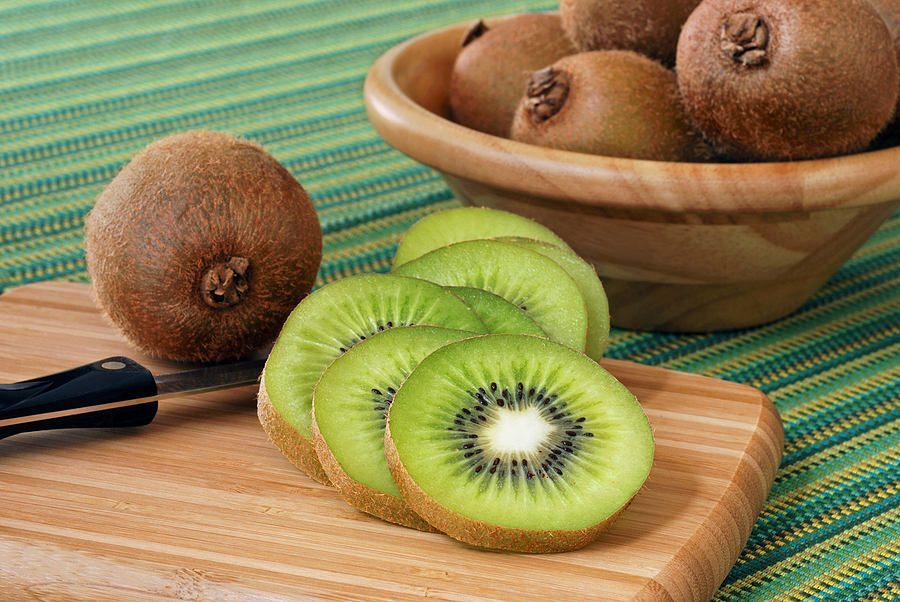
Updated November 15, 2021 l by Tara E.
The Small Fruit with Amazing Benefits
Is kiwi fruit good for your health? Chinese Gooseberry, better known as kiwi fruit, is your ticket to good health. This tiny fruit remains one of the best-kept secrets in the fruit family. Yet, this vitamin-rich fruit offers a wealth of benefits that make it worthy of being an ingredient in your dietary ritual of eating.
Native to China but grown in other countries like Italy, Spain, France, and New Zealand, kiwi is available in more than 40 varieties. Sure, your taste buds are probably watering at the thought of eating the tangy, green-speckled fruit, but here are five reasons to add kiwi to your diet.
Health Benefits of Eating Kiwi
Kiwi is Rich in Fiber
If your digestive health could use a left, kiwi is an excellent source of fiber. Kiwi contains the fiber pectin and the substance Actinidin. Fiber enhances digestive health and removes unwanted fat and toxins from the body.
Another benefit of fiber is that it helps all feel fuller after meals which is a great asset to those looking for ways to lose weight.
Kiwi can serve as a “tie-me-over snack” due to its 3 grams of fiber.
Next, pectin is a beneficial fiber that helps to lower cholesterol.
Actinidin is a digestive enzyme that participates in the breakdown of protein in the gastric system.
Vitamin C Powerhouse
Kiwi contains vitamin C, which boosts immunity and protects us from illnesses and viruses like the flue or common cold. Vitamin C protects us from cancers like colon and breast cancer. Also, kiwi can have the same effects as taking an aspirin each day. It can prevent heart disease but minus the side effects like intestinal tract bleeding.
Vitamin E for Skin Health
Kiwi is a good source of vitamin E. Vitamin E is a potent antioxidant that can help against potential skin degeneration and work wonders for the skin’s health.
Other Benefits of Eating Kiwi
Tangy in taste and juicy in flavor, kiwi can be eaten solo or added to drinks. You can also enhance the flavor of your fruit salads, or add it to the top of cakes. Kiwi is rich in potassium, containing more potassium than even a banana. Why is potassium important to the diet?
Potassium is responsible for improving our muscles’ overall function. It can prove to be especially important to athletes. Also, it helps us maintain a low glycemic index, which is of particular importance to those who are diabetics. Potassium also helps to regulate blood pressure. One of potassium’s most significant roles is to maintain body fluids and electrolyte balance. This control aids in regulating the heart rate and blood pressure by countering the effects of sodium.
Do you suffer from asthma? You may definitely want to consider adding this jewel to your diet. Studies show that kiwi prevents symptoms such as wheezing and coughing. This benefit is an indicator that this fruit has a general ability to improve respiratory function.
Kiwis are a low-calorie fruit that is good for those following a low-calorie diet. Kiwi also contains folate, which for pregnant women, is critical to an unborn baby’s development. Pregnant women require anywhere between 400 to 800 micrograms of folic acid to develop their baby’s brain and cognitive development.
How to Pick a Ripe Kiwi
When shopping for kiwi fruit, you will want to first test the firmness of the fruit. To do this, gently apply some pressure by giving a slight squeeze. A ripe kiwi will give way under pressure. Note that the give is minor in nature. You should be careful not to select kiwi that has shriveled or appears to be bruised. These characteristics may be a sign of fruit that is beyond ripe.
Storing Kiwi Fruit
Kiwi can be stored either in the refrigerator or on the countertop. If you choose to leave kiwi out, unrefrigerated in the natural elements, its life span shortens to a day. Refrigeration will extend the lifespan of your kiwi fruit to a range of several days to four weeks.